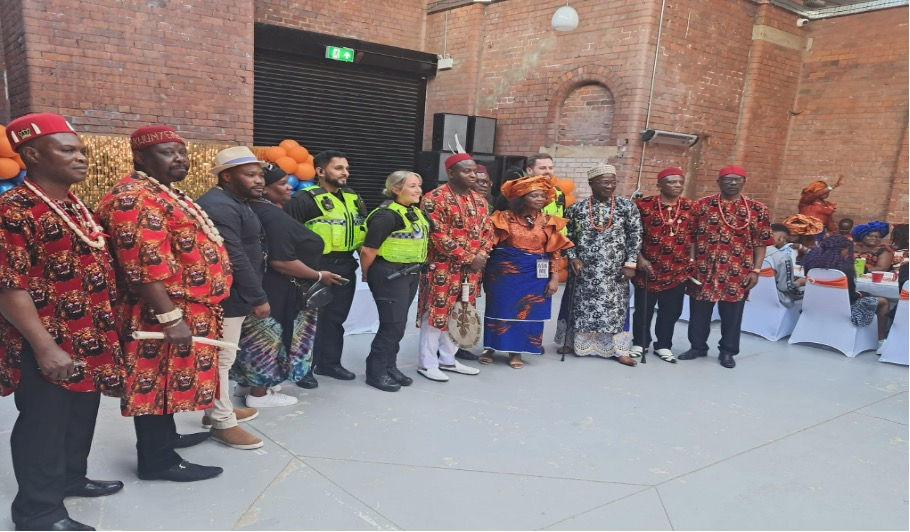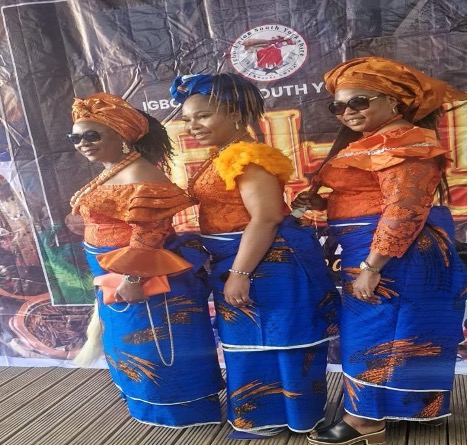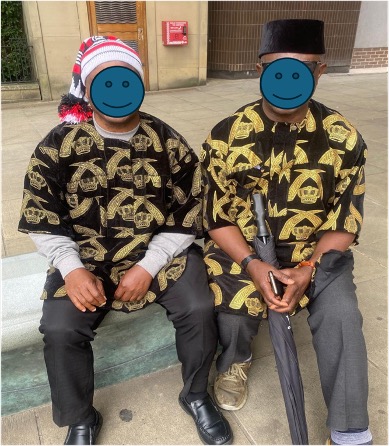IRI-JI in Sheffield: A Sun-Bright Day of New Yam, Old Wisdom, and Fierce Joy
- Dr Ada Achinanya
- Aug 14, 2025
- 6 min read
On the 2nd of August 2025, the Igbo Union South Yorkshire, a 300-strong community, gathered in Sheffield to celebrate ‘IRI-JI’, the New Yam Festival.
IRI-JI marks harvest and thanksgiving. Even in diaspora, it anchors the calendar, identity, and intergenerational teaching of the Igbo community and its people. If you’re studying community resilience, start here: the festival serves as both a ritual and a social infrastructure. I (Ada Achinanya) came to the Iri-Ji as both participant and researcher/note-taker: feet in the drum circle, pen in the margins. This blog post braids the day’s rituals, which include the kolanut blessing, the first cut of yam, the dances, the masquerade, with the quiet lessons they teach about kinship, consent, youth mentorship, foodways, and civic belonging in diaspora. You’ll see the celebration exactly as it unfolded to me, and alongside it, my brief ‘researcher tips’ drawn from conversations, observation, and cultural protocols (always with permission, always with reciprocity in mind). My aim for this blog is simple: to honour the festival’s heartbeat while offering practical insights for anyone seeking to engage this community respectfully, so the scholarship deepens the relationship, not the other way around.

The Doorway of the Kola-Nut (Iwa-Oji)
I arrived to the sound of drums that felt like a heartbeat you could walk to. You could taste celebration in the air: pepper and palm oil, dust and laughter, a chorus of greetings that made strangers feel like cousins. It was one of those days that makes living in the ‘diaspora’ feel less like distance and more like a bridge.
We began with ‘Iwa-Oji’, the kola-nut blessing. Elders lifted the nut like a small sun, speaking prayers that braided memory with hope, honouring ancestors, asking God for health, unity, and good harvests (in the UK, that means good work, good grades, and yes, sometimes actual allotment yams). When onye isi oji (kola leader), split the kolanut, the room breathed out together, with a resounding ‘ise’ (meaning, Amen).
Tips for researchers: When you arrive, greet elders first. Learn a few: Nnoo/Nnọọ (welcome), Kedu? (How are you?). Observe the kola-nut ritual before interviews or photo-taking; it’s the community’s “opening ceremony” for the day’s social contract. Ask who the onye isi oji (kola leader) is and request permission before recording. However, also remember that consent is layered; event permission ≠ personal consent.
The First Slice of Plenty (Iwa-Ji)
Next came ‘Iwa-Ji’, the ceremonial breaking of the new yam. The yam, stout, earthy, defiant, was lifted, blessed. The knife’s gentle press, the careful reveal, soft, white, steaming, sent a ripple of approval through the room. We clapped not merely for a tuber, but for survival, for harvests past and future, for the stubborn joy of a people who have weathered more than most and still insist on thanksgiving. Children pressed forward, eyes wide. An elder whispered to them that yams are the “king of crops,” a lesson about labour, land, and pride wrapped in a snack-sized metaphor.
Tips for researchers: Iwa-Ji symbolises productivity and gratitude. If you’re documenting foodways, note that yam is also a character in Igbo storytelling, not just a crop. Capture the language used around it: ji, nri ji, onye oru (a hardworking person).
Masks, Muscles, and Motion
The programme swung from solemn to ecstatic and back again. ‘Igbá Mgba’ (traditional wrestling) drew a ring of cheers and laughter. A circle opened, and two wrestlers faced off, sinew against sinew; the crowd punctuated each grip with shouts of counsel and delight. It’s sport, yes, but it’s also a masterclass in respect and controlled strength. Next, the ‘Agaba’ Masquerade swept in with a gust of mystery, raffia rustling, colours flashing, a presence that felt half-theatre, half-thunder. Children squealed and then leaned closer, the way we all do when fear and fascination hold hands. The ‘Atilogwu’ youth dancers were all electric, executing airborne flips and precise footwork, followed swiftly by the ‘Umu-oji’ women’s dance, which offered a counterpoint: grace, elegance, wrists and storytelling waists drawing cursive patterns in the air, following the beats of the drums.
Tips for researchers: Masquerades (called mmanwụ) occupy sacred-performative spaces; not all are suitable for casual filming. Always ask an organiser whether a specific troupe (e.g., masquerade, dancers) permits recording and clarify how the footage will be used. Offer to share copies with the group’s archive.
What We Wore, What We Said Without Speaking
The hall shimmered. Everywhere I looked, people wore their native attire. Women paired blouses with two wrappers knotted at the waist, and headscarves (called ichafu) tied like crowns that knew their worth, all carrying stories on their hems. Men turned up in ‘isi-agu’ (lion-head) tops, wrappers or trousers, and red/black caps on tilted heads. Beads clicked softly, portable history in coral and brass.
Tips for researchers: In your dressing, business casual is fine, and when addressing people, use titles when introduced: Chief, Nze, Lolo, Sir/Madam. Compliment outfits and ask the story of a cloth’s motif or a bead set; attire often signals hometown, lineage, or title. If you photograph people, offer to airdrop or email the shots, and reciprocity builds trust.
Eating what we celebrate
The food, OMG the food! The food table was a constellation. Platters seemed to multiply. Bowls of abacha with fish (that tangy, irresistible Igbo salad) sat beside coleslaw (because diaspora is fusion). ‘Onugbu’ (bitter leaf soup) and egusi anchored the table, thick and fragrant, ready for every kind of swallow. There was rice with vegetable sauce, moi-moi, fried plantain, and a battalion of snacks, puff-puff, chin-chin, meat pies, circulating like edible confetti.
For ‘dessert’, we laughed and licked our fingers over peppered gizzard and chicken suya, because who says sweetness can’t have heat? Everything was tasty and unapologetically generous. Aunties insisted on seconds with the kind of insistence that leaves you no honourable exit.

Tips for researchers: Food is a consent-friendly conversation starter. Ask about ingredients, origins, and who taught the cook; you’ll certainly map migration routes and kin networks without a survey form. Regarding food etiquette, try what you’re offered unless you have allergies. If you decline, do so politely and explain your reason.
A Civic Blessing

Mid-afternoon brought a surge of pride as the Honourable Mayor of Sheffield, Councillor Safiya Saeed, arrived. The first female African Lord Mayor, leading a major city. Her presence drew cheers and the kind of applause that felt like a promise, saying, ‘Visibility matters.’ The mayor’s presence said: You belong here, not as guests, but as authors.
This was especially meaningful because the night before, at 7:10 pm, the event had been introduced live on BBC Radio Sheffield, Lincolnshire, Humber, and York, inviting the wider public to witness, and you could feel the difference, as new faces mingled with the regulars. Diaspora doesn’t whisper; it broadcasts.
Tips for researchers: Track these civic touchpoints. Attendance by local officials isn’t symbolic fluff; it often unlocks venue access, funding pathways, and future partnerships. Ask organisers how they secured it; there’s a playbook hiding in plain sight.

Memory, War, and the Will to Thrive
People shared stories, some embroidered with humour, others shadowed by the ‘Biafran War’ (Nigerian Civil War, 1967-1970). And yet the through-line was unmistakable: resilience. There’s a saying I heard again: “If you go to a country and don’t find an Igbo person there, leave immediately; don’t invest.” It’s boastful, yes, but also a history lesson. A declaration that after hardship, industry became theology. You could see it in the vendors, the organisers ticking off logistics, and the way everyone cleaned the hall as if it were a grandmother’s sitting room. From the trauma of the Biafran war to the economies built in diaspora, “industrious” is not a stereotype here; it’s a survival skill.
Tips for researchers: Approach trauma histories with care. Let community members lead. Offer anonymity by default. Ask if there’s a preferred elder or historian (Nze, Lolo, union PRO) to contextualise sensitive topics.
What The Day Teaches
What held me most was the intergenerational weave. Small hands tucked into larger ones during the blessing; teenagers watched the masquerade with a seriousness that read like study. Others, trying out steps from ‘Atilogwu’ dancers with the gravity of apprentices. Elders bent to their height to explain proverbs. You could see culture travelling the way it always has, hand to hand, laugh to laugh.
By sunset, the drummers softened, and the hall smelled like wood polish and pepper soup. I felt that peculiar fullness festivals give you: fed, taught, and claimed. I also felt truly blessed to stand inside a tradition that endures, grateful to be part of a community that keeps its culture not in a museum case, but in motion, in music, in recipes, and in the way elders pass kola nuts and children learn the steps. To belong to a resilient species, one that plants itself wherever Igbo people settle and then bears fruit, year after year. ‘IRI-JI’ isn’t just a festival; it’s a community management system disguised as a party. It’s onboarding for the young, accountability for the titled, soft power for the diaspora, and a gift to the city that hosts us.

Tips for researchers: If you come with humility and leave something useful behind, you won’t just study a festival; you’ll be welcomed back into a living tradition. And next August, when the yam returns, so will you.
Author

Dr. Ada Achinanya
Research Associate










